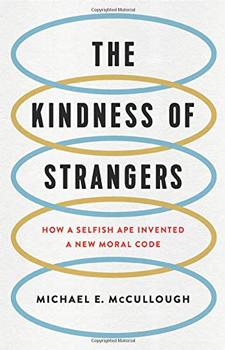Summary | Excerpt | Reviews | Beyond the Book | Readalikes | Genres & Themes | Author Bio

 Book Reviewed by:
Book Reviewed by:
Grace Graham-Taylor
Buy This Book
Part of what makes modern generosity toward strangers so remarkable is the seemingly long odds against it. By most scientific accounts, the humans from whom we are descended were fanatically xenophobic, ready to greet needy strangers not with clean water, a hot meal, or a place to lay their heads for the night, but with spears and arrows instead. Just a few days before I sat down to draft these words, in fact, a Christian missionary from the United States was pinioned with arrows by members of a still-uncontacted tribe of hunter-gatherers on Sentinel Island in the Bay of Bengal. Later, the Sentinelese dragged the missionary's body out to the beach and buried it there. What makes our attitudes toward strangers so different from theirs? Modern humans' concern for the welfare of perfect strangers has no analog in the rest of the animal kingdom or even in most of our own history as a species. It's a true one-off. As such, it calls out for a special explanation.
Most modern historians have tried to help us understand the history of human generosity by serving it up one small bite at a time. One historian writes about philanthropy in ancient Athens, another about almsgiving in medieval Europe, another about the Elizabethan Poor Laws of sixteenth-century England, another about the nineteenth-century stirrings of the modern welfare state, and still another about twentieth-century efforts to eliminate poverty from the face of the Earth.
Other scholars, admittedly fewer in number today than a century ago, have sought to explain the rise of generosity as the result of historians' own version of Adam Smith's invisible hand: civilization. The Irish historian William Hartpole Lecky was one of the major exponents of the civilizationist theory of moral progress. In Lecky's view, humanity's regard for the welfare of strangers resulted from a centuries-long civilizing process in which superstition, xenophobia, and a stultifying satisfaction with the status quo were replaced by reason, cosmopolitanism, and a spirit of experimentation and self-improvement. A widening of the breadth of human charity came along for the ride. As Lecky wrote in his two-volume History of European Morals in 1869, "history tells us that, as civilisation advances, the charity of men becomes at once warmer and more expansive, their habitual conduct both more gentle and more temperate, and their love of truth more sincere."11 Many other Victorian writers were also civilizationists (also known as progressives). Darwin himself was a civilizationist of sorts, as were many of the reformers responsible for the social innovations that we still rely on today to assist strangers.
Despite historians' many invaluable contributions to our understanding of the kindness of strangers, the one-bite-at-a-timers and the civilizationists alike have committed one important oversight: in their efforts to explain altruism and compassion using the standard tools of the historian, they have failed to grapple with the natural human faculties— our characteristic beliefs, desires, motivations, emotions, and cognitive powers— that were activated on a mass scale by the twists and turns of history to produce the penchant for helping strangers that we indulge today. To quote the cognitive scientist Pascal Boyer, minds make societies.12 Thus, to fully explain how Homo sapiens came to greet needy strangers with compassion rather than cruelty, we have to understand why people believe what they believe, ponder what they ponder, and want what they want—and how they then figure out how to get it. We have to explain how a human mind that is built for a stone-aged world in which strangers were feared and killed can fashion a world for itself in which strangers are respected and assisted.
Complementing the historians' approach to explaining human generosity is an approach that comes from the evolutionary sciences. For several decades, evolutionary biologists and evolutionary social scientists have been obsessed with humans' generosity toward strangers, precisely because of its seeming implausibility. How could a penchant for wasting valuable resources on complete strangers evolve? After all, natural selection runs on reproductive fitness, and reproductive fitness runs on resources, so the more resources you keep for yourself, the better. Wouldn't evolution punish people who got into the habit of giving stuff away to nobody in particular?
Excerpted from The Kindness of Strangers by Michael E McCullough. Copyright © 2020 by Michael E McCullough. Excerpted by permission of Basic Books. All rights reserved. No part of this excerpt may be reproduced or reprinted without permission in writing from the publisher.





The House on Biscayne Bay
by Chanel Cleeton
As death stalks a gothic mansion in Miami, the lives of two women intertwine as the past and present collide.

The Flower Sisters
by Michelle Collins Anderson
From the new Fannie Flagg of the Ozarks, a richly-woven story of family, forgiveness, and reinvention.

The Funeral Cryer by Wenyan Lu
Debut novelist Wenyan Lu brings us this witty yet profound story about one woman's midlife reawakening in contemporary rural China.
Your guide toexceptional books
BookBrowse seeks out and recommends the best in contemporary fiction and nonfiction—books that not only engage and entertain but also deepen our understanding of ourselves and the world around us.